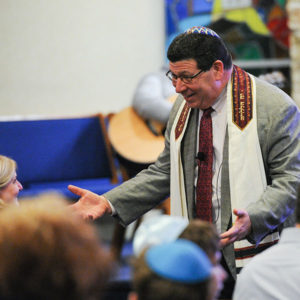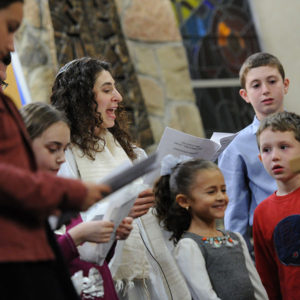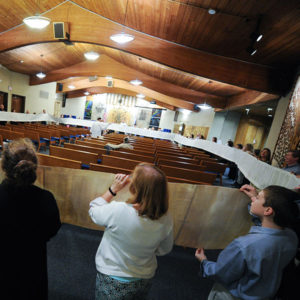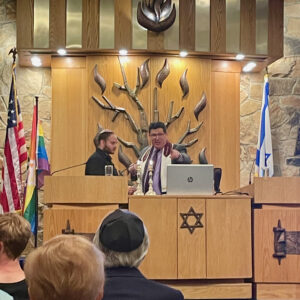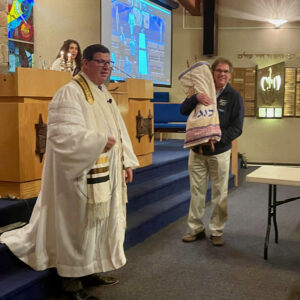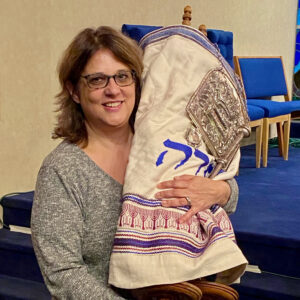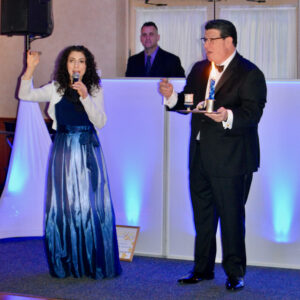Please Join Us
Prayer is a language that each of us speaks and hears in a different way. When we pray together, we try to find meaning within the chorus of diverse voices. With engaging sermons, stimulating teachings, and meaningful prayer intertwined with music, our clergy show us how the lessons from the past are relevant to our lives today.
Through a wide range of spiritual experiences we offer something for everyone, including weekly Shabbat evening and Shabbat morning services. In addition, special services are held throughout the year which include “Pray and Play,” “Shalom Yoga,” and so much more.
Our services are fully egalitarian (men and women participate equally). We believe we have found a healthy balance between the traditional and the creative. Services are a blend of Hebrew and English that helps everyone feel comfortable. Our prayer book, Mishkan T’filah, contains transliterations adjacent to all Hebrew prayers so that everyone, including guests, can participate easily and fully. We use both traditional and contemporary melodies. People who attend vary from those with traditional backgrounds to Jews by choice as well as guests of all faiths.
Schedule of Services:
Shabbat Evening Service
Erev Shabbat Services: Fridays, 7:00 pm (except the 1st Friday night of the month)
Kabbalat Shabbat Services: 1st Friday night of the month – 6:30 pmMorning Service
Saturdays
10:30 am, September - JuneHoliday Services & Special Events
Please see our Calendar for a full listing of services
Rock Shabbat Services
Check here for more information on our musical Shabbat services.
Rabbi's Most Recent Shabbat Greetings:
This week’s Torah portion, Vayeshev (Genesis 37:1-40:23), begins the long and painful story of Joseph and his brothers. It is a portion filled with darkness through jealousy, betrayal, loss, and confusion. Joseph is thrown into a pit, sold as a slave, and taken far from home. Nothing about this portion feels miraculous; if anything, it feels like the opposite. And yet, Vayeshev is the perfect portion to read right before Chanukah, because it teaches us something essential – miracles often begin in moments when we see no light at all.
When Joseph is thrown into the pit, the Torah adds a small detail: The pit was empty; there was no water in it.” (37:24) The rabbis note that while there was no water, there were snakes and scorpions. In other words: it was a frightening, dangerous place. But this moment, this lowest point, sets in motion Joseph’s rise. From the pit he is taken to Egypt; from Egypt he rises to power; and through his rise, he eventually saves his family and ensures the future of the Jewish people.
The miracle isn’t obvious. It doesn’t look like a jar of oil that burns for eight days. It looks like a mess. It looks like a disaster. And yet, God is quietly at work behind the scenes. That is the message of Vayeshev as we approach Chanukah: Sometimes the miracles is already happening even when we cannot yet see the light.
The miracle of Chanukah also begins with something hidden. When the Maccabees entered the desecrated Temple, everything looked hopeless. The odds were against them. The only oil they found was a small, sealed jar; hardly enough to matter. But they lit it anyway. They acted as though the light could return, even before they had proof. And the miracle came.
Just as Joseph’s redemption begins in a pit, the miracle of Chanukah begins in a dark Temple. Both stories remind us: light does not wait for perfect conditions – light grows when we decide to light it.
As we prepare for Chanukah, we often ask: Where are the miracles today? They rarely appear as supernatural events. Instead, they show up the same way they do in Vayeshev – quietly, subtly, through human choices that open the door for something greater. Nowadays, a miracle occurs when someone chooses kindness at the moment bitterness feels easier; when families fractured by conflict take the first step toward reconciliation; when a person trapped in despair finds the courage to hope again; when communities choose unity instead of fear or suspicion; and when one small act of goodness sparks a chain reaction of light.These aren’t just “nice moments.” They are modern candles – each one a flame pushing back the darkness.
Joseph could not see the miracle when he was in the pit. The Maccabees could not see the miracle when they lit that tiny jar of oil. Yet the miracle came because they acted with faith and courage. So the question for us, preparing for Chanukah, is simple: Where is the small jar of oil in our own lives that we have been too afraid to light? Maybe it’s reaching out to someone we’ve grown distant from; or tackling a challenge we’ve been avoiding; or choosing to bring kindness into a world that sometimes feels anything but kind. Chanukah tells us that even a small beginning can shine far brighter than we imagine.
This year, as we light the candles and watch their glow expand night by night, may we open our eyes to the hidden miracles already growing around us—and may we be bold enough to create new ones.
SHABBAT SHALOM AND MAY CHANUKAH BRING YOU RENEWED LIGHT AND HOPE
Keep Reading
